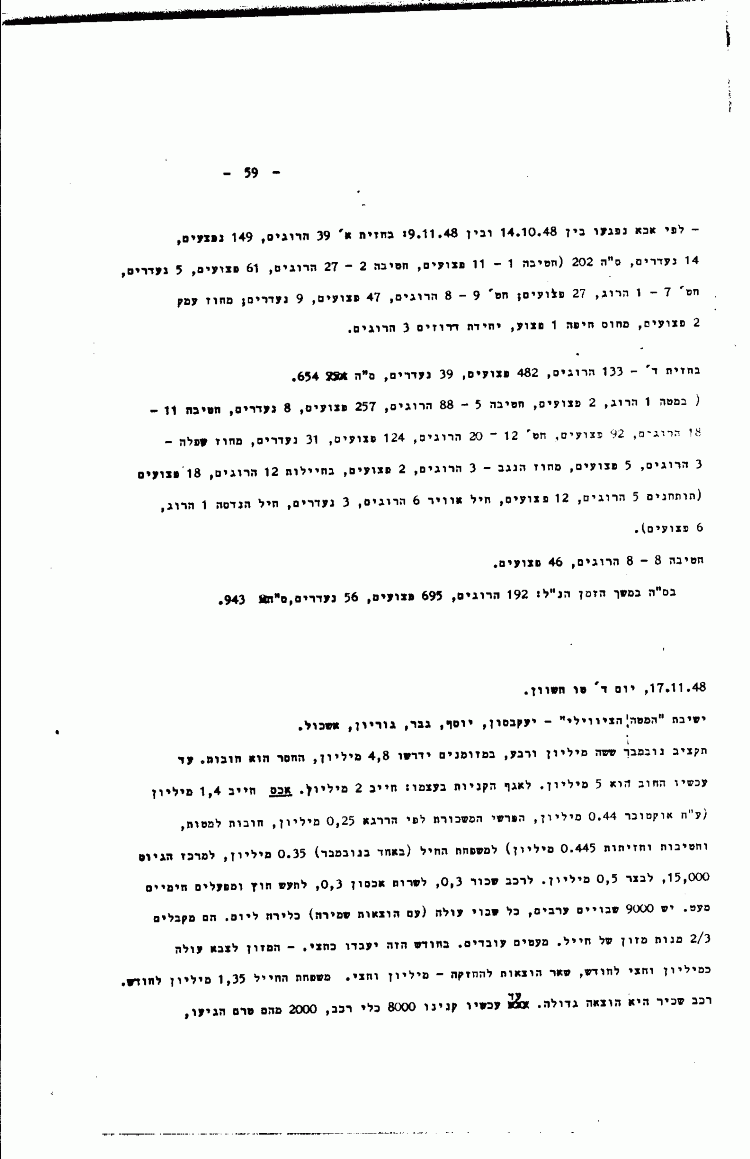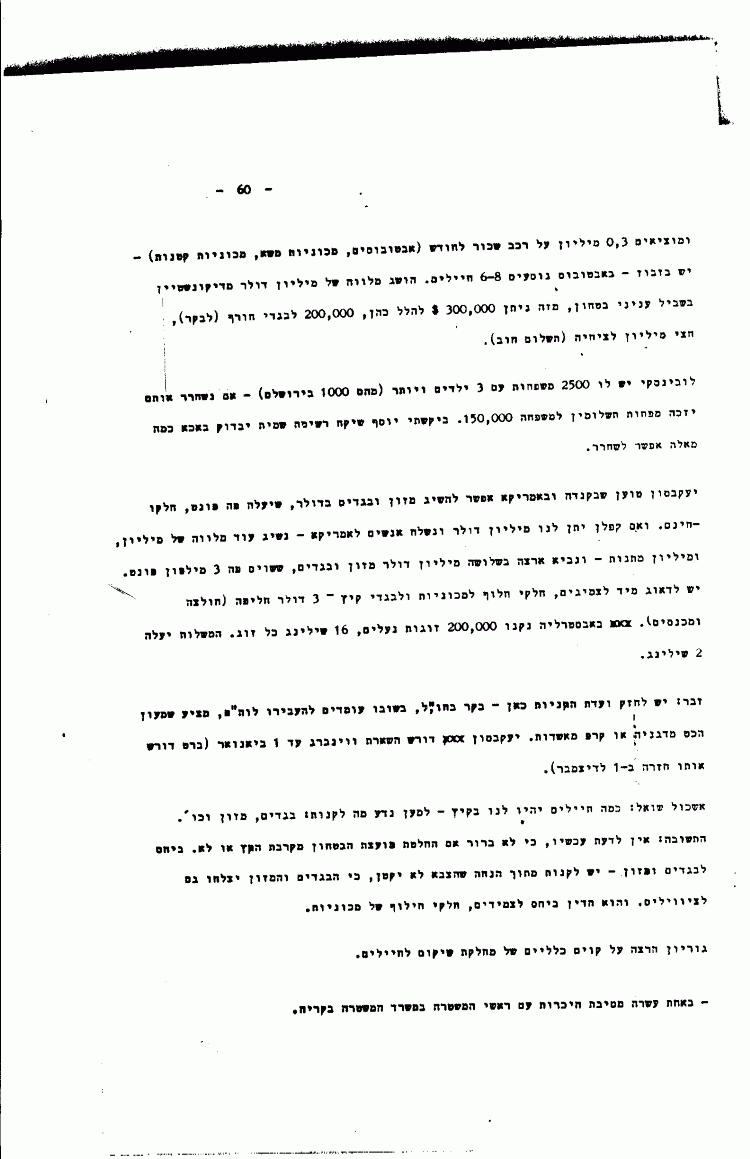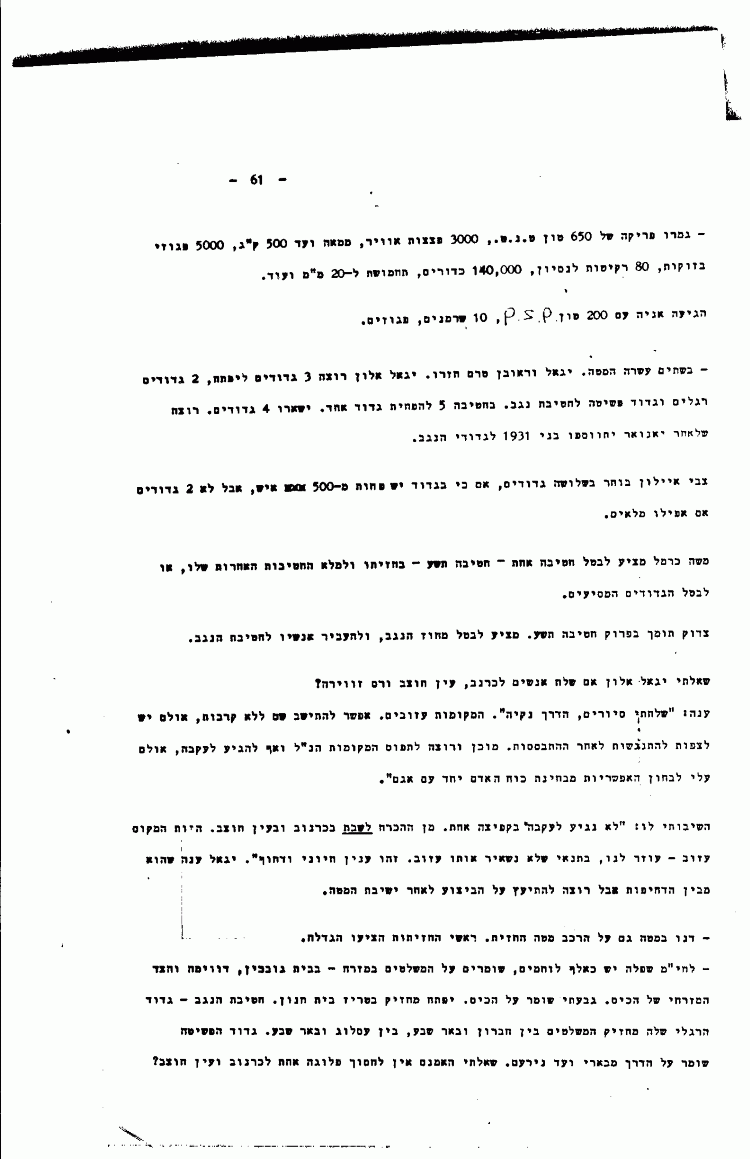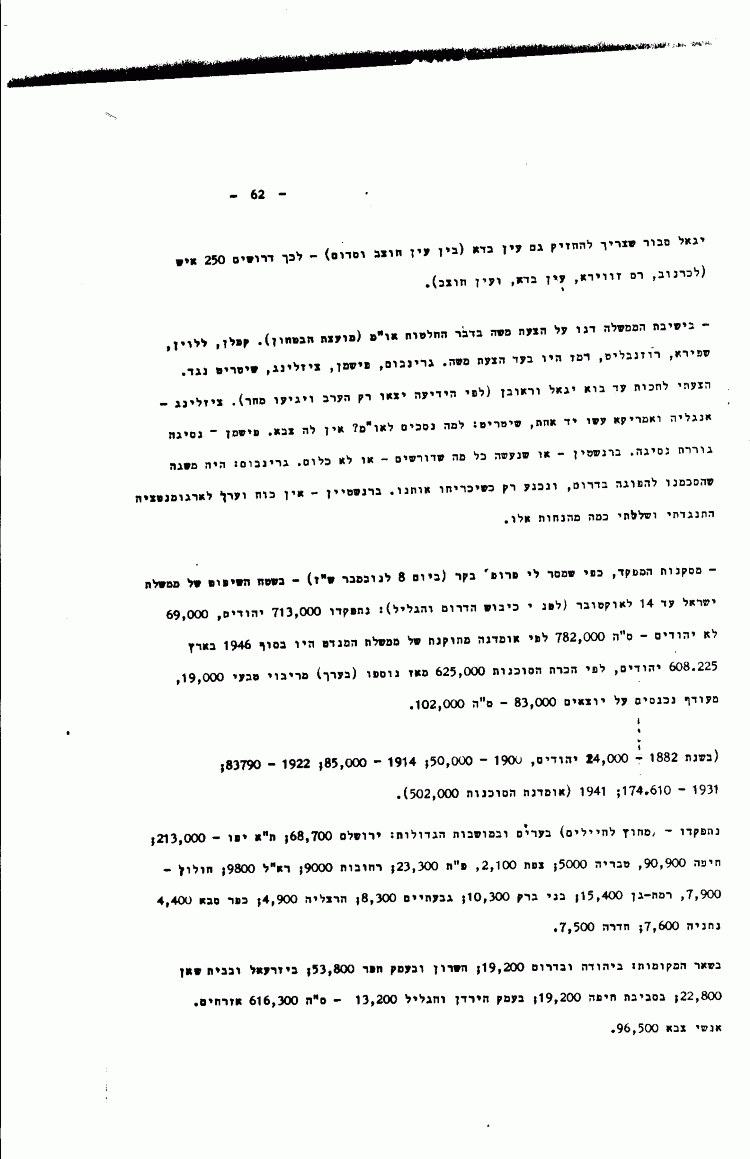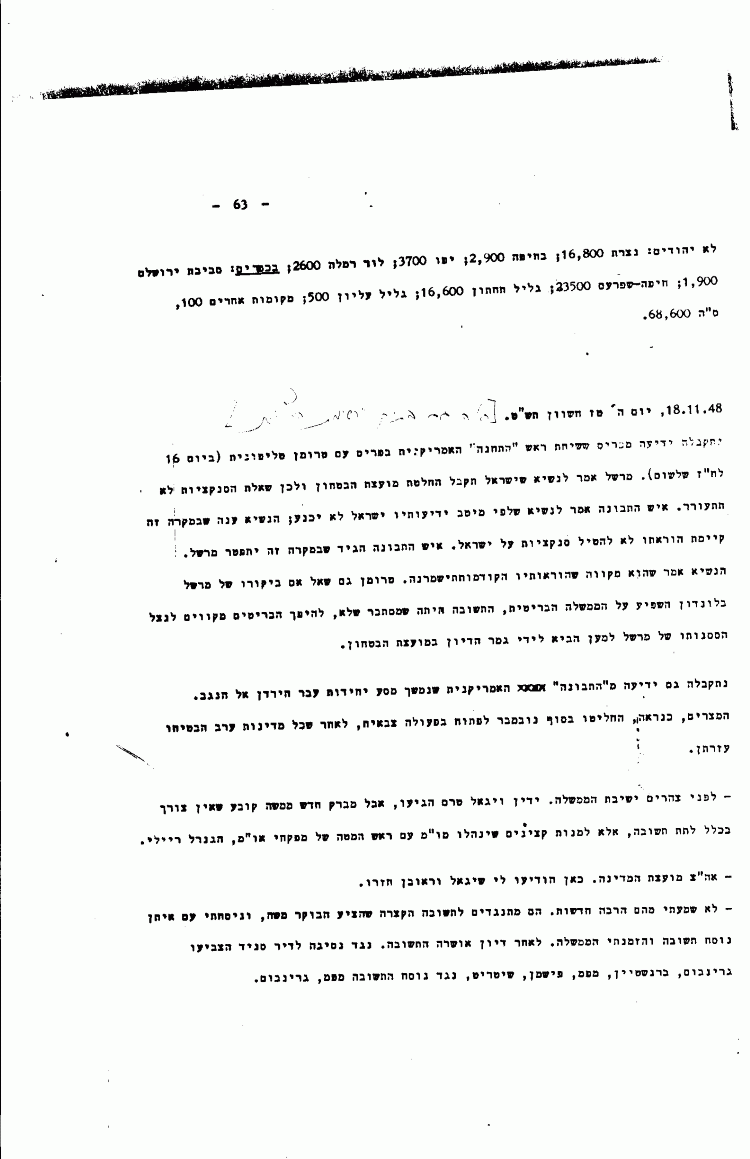Wednesday, November 17, 1948
A meeting of the "civilian staff" [in the Ministry of Defense] - [Yosef] Yaakovson, Yosef [Yizraeli], [Avraham] Zabar, [Yosef] Gurion, [Levi] Eshkol. The November budget is 6¼ million, 4.8 million will be needed in cash, the missing portion is debts. So far the debt is 5 million. To the Procurements Department by itself: 2 million owed. ACHS [Finances Department?] owes 1.4 million (for October 0.44 million, salary increments per ranking 0.25 million, debts to staffs, and brigades and fronts 0.445 million) for the soldiers family (on November 1) 0.35 million, for the recruitment center 15,000, for fortification 0.5 million. For vehicle rental 0.3, for housing service 0.3, for foreign weapons manufacturing and chemicals factories a small amount.
There are 9,000 Arab POWs, each POW costs (including guarding expenses) about a lira [P£] per day. They receive 2/3 of the food ration of a soldier. A few of them work. This month about half will work.
Food for the army costs about 1.5 million per month, the remaining upkeep expenses - 1.5 million. The soldier's family 1.35 million per month.
Vehicle rental is a large expense. So far we've bought 8,000 vehicles, 2,000 of them haven't arrived yet, and we're spending 0.3 million on vehicle rentals per month (buses, trucks, small cars - there's waste - buses carrying 6-8 soldiers).
A loan of $ 1 million was obtained from [Avraham] Dickenstein [Histadrut delegate in the US] for defense needs, of which $ 300,000 was given to Hillel Cohen, 200,000 for winter clothing (to [Aharon] Becker), half a million to Czechoslovakia (payment of debt [for procurement]).
Lubinski [Giora Lotan] has 2,500 [heads of] families with 3 or more children (1,000 of them in Jerusalem) - if we release them [from military service], it reduces payments to families by 150,000. I asked Yosef [Gurion] to take a list of names and check with the Personnel Department to see how many of them can be released.
Yaakovson says that food and clothing that would cost a pound [Israeli lira] here can be obtained in Canada and America for a dollar, some of it - free. And if [Eliezer] Kaplan gives us $1 million, we'll send people to America - we'll get another loan of a million, and a million [in] gifts - and we'll bring back food and clothing for three million, which would be worth [would cost] 3 million pounds here. [We] need to immediately acquire tires, spare parts for vehicles, and summer clothing - $3 for an outfit (shirt and pants). In Australia 200,000 pairs of shoes were bought, 16 shillings per pair. The shipment will cost 2 shillings [shilling - 1/20 of a pound sterling].
Zabar: The procurements committee here should be strengthened. [Aharon] Becker is abroad. When he returns he'll be transferred to the [Histadrut] Executive Committee. Proposes Shimon Hecht from Degania or [Zeev] Karp from Ashdot[-Ya'akov]. [Yosef] Yaakovson insists that [Aryeh] Weinberg [of Bank Leumi] remain until January 1 ([Aron] Barth insists on having him back on December 1).
Eshkol asks: How many soldiers will we have in the summer - so that we know what to buy: clothes, food, etc. The answer: We cannot know now, because it is not clear whether the Security Council resolution [of November 16] will hasten the end or not. Regarding food and clothing - purchasing should be based on the assumption that the army will not shrink, because the clothing and food can also serve civilians, and the same applies to tires and spare parts for vehicles.
Gurion spoke about the general contours of the soldiers' rehabilitation law.
- At ten an introductory gathering with the police chiefs at the Ministry of Police in the Kirya [government compound].
- Unloading has been completed for 650 tons of TNT, 3,000 aerial bombs, from 100 to 500 kg, 5,000 bazooka shells, 80 trial rockets, 140,000 rounds, ammunition for 20 mm, etc.
A ship arrived with 200 tons PSP [pressed steel plates for airfield landing strips], 10 Sherman [tanks], shells.
- At 12 the [General] Staff. Yigael [Yadin] and Reuven [Shiloah] haven't returned yet [from Paris]. Yigal [Allon] [Southern Front] wants 3 battalions for Yiftah [reinforcement of the brigade to the strength of three battalions], 2 infantry battalions and a raid battalion, and the Negev Brigade. In the 5th Brigade [Givati] to reduce one battalion. 4 battalions will remain. He wants to have the [NAHAL trainees] born in 1931 added to the Negev battalions after January.
Zvi Ayalon [Center ("Merkaz") Front] opts for three battalions, even though a battalion has fewer than 500 men, but not 2 battalions, even if they're full.
Moshe Carmel [Northern Front commander] proposes eliminating one brigade - Brigade Nine (Oded) in his front, and filling his other brigades - or eliminating the auxiliary battalions [in his brigades].
Zadok supports disbanding Brigade Nine. Suggests eliminating the Negev district [garrison] and transferring its men to the Negev Brigade.
I asked Yigal Allon whether he'd sent men to Kurnub [Mamshit], ''Ein Husub [Hatzeva], and Ras Zuweira [Rosh Zohar]. He replied: "I sent patrols; the path is clear." The places are closed [the police stationed at these locations were closed]. [We] can settle there without combats, although clashes can be expected after settling in. [He's] willing and able to seize these places and even to reach ''Aqaba, but "I must examine the possibility in terms of manpower along with the Operations Department."
I replied: "We won't reach ''Aqaba in one fell swoop. It's imperative [that we] settle into Kurnub and ''Ein Husub. The fact that the place is abandoned - helps us, on the condition that we don't leave it abandoned. This is an imperative and urgent matter."
Yigal responded that he understands the urgency, but wants to consult on the execution after the Staff meeting.
The Staff also discussed the composition of the front staff. The heads of the fronts proposed enlargement.
The Shfela [district] garrison has about a thousand fighters, guarding the strongholds in the east - Beit Jubrin, Dawayima, and the eastern side of the "pocket." Givati is guarding the "pocket." Yiftah has ahold of the Beit Hanoun wedge. The Negev Brigade - its infantry battalion has ahold of the strongholds between Hebron and Beersheva, between ''Isluj and Beersheva. The raid battalion is guarding the route from Be'eri to Nirim. I asked if one company really couldn't be spared for Kurnub and ''Ein Husub. Yigal thinks it's also necessary to get ahold of ''Ein Beida (between ''Ein Husub and Sdom) - this requires 250 men (for Kurnub, Ras Zuweira, ''Ein Beida, and ''Ein Husub).
- At the government meeting we discussed Moshe [Sharett]'s proposal regarding the UN [Security Council] resolutions [of November 4 and 16]. [Eliezer] Kaplan, [Isaac Meir] Levin, [Moshe] Shapira, [Pinchas] Rosenblüth, [and David] Remez were in favor of Moshe's proposal. [Yitzhak] Gruenbaum, Fishman [Rabbi Maimon], [Aharon] Zisling, [Bechor] Sheetrit against. I suggested waiting until Yigael [Yadin] and Reuven [Shiloah] are here (reportedly they'll only leave tonight and arrive tomorrow). Zisling: - England and America will work together; Sheetrit: Why should we acquiesce to the UN? It has no army; Fishman: withdrawal leads to [further] withdrawal; Bernstein: We either do everything they demand - or nothing; Gruenbaum: It was a mistake on our part to agree to a truce in the south, and we'll submit only when they force us to; Bernstein: There's no force or value to the argumentation.
I objected and refuted some of these assumptions [see also below].
- The findings of the census, as reported to me by Prof. [Roberto] Bachi (on November 8 of this year) - within the jurisdiction of the government of Israel up to October 14 (before the conquest of the south and the Galilee): 713,000 Jews, 69,000 non-Jews - 782,200 total - were registered.
According to an amended estimate of the Mandate government, at the end of 1946 there were 608,225 Jews in the country; according to a [Jewish] Agency assessment there were 625,000. Since then natural increase has added (approximately) 19,000, the balance of incomers minus those who left is 83,000 - in total 102,000.
(In 1882 - 24,000 Jews; 1900 - 50,000; 1914 - 85,000; 1922 - 83,790; 1931 - 174,610; 1941 - (Agency's estimate) - 502,000).
Numbers recorded - (aside from soldiers) in the cities and large settlements: Jerusalem 68,700; Tel Aviv Jaffa - 213,000; Haifa 90,900, Tiberias 5,000; Safed 2,100, Petah Tikva 23,300; Rehovot 9,000; Rishon LeZion [?] 9,800; Holon 7,900, Ramat Gan 15,400; Bnei Brak 10,300; Givatayim 8,300; Herzliya 4,900; Kefar Saba 4,400, Netanya 7,600; Hadera 7,500.
Elsewhere: In Judea and the south 19,200; the Sharon and in Emek Hefer 53,800; in Jezreel and Bet She'an 22,800; in the Haifa surroundings 19,200; in the Jordan Valley and the Galilee 13,200 - total 616,300 civilians. 96,500 military personnel.
Non-Jews: Nazareth 16,800; in Haifa 2,900; Jaffa 3,700; Lod [and] Ramle 2,600; in the villages: Jerusalem surroundings 1,900; Haifa - Shfar'am 23,500; Lower Galilee 16,600; Upper Galilee 500; elsewhere 100, total 68,600.





